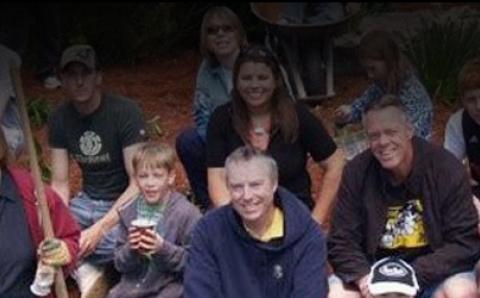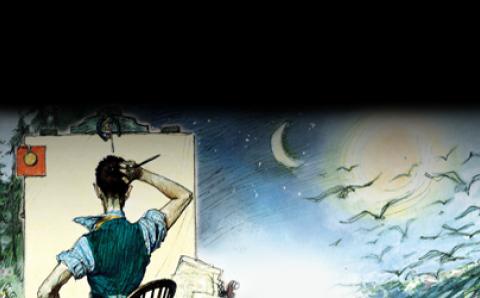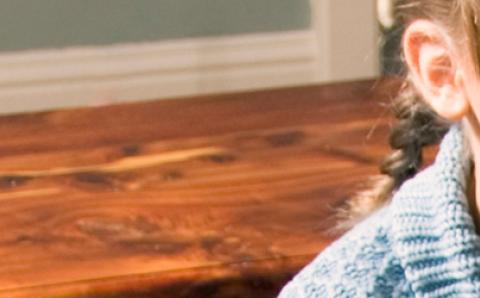Susan Ducu is a mother of four and a member of Aber Anglican Church in Uganda.
Building relationships and trust with those in the community has been a key part of CRWRC’s success. Ida Kaastra-Mutoigo befriends children in Uganda in the 1980s.
In 2002, the young woman lost her husband to AIDS. Soon afterward, she also tested positive for HIV.
Since then, thanks to a program supported by the Christian Reformed World Relief Committee (CRWRC), Ducu has dedicated her life to providing physical, emotional, and spiritual support to more than 157 people living with AIDS.
“When I tested HIV-positive, I made up my mind to help those who were going through a difficult time like me,” she said.
Ducu is just one of many Christians with a heart for those in need who make up the core of CRWRC’s ministry.
A Diaconal Agency for the CRC
It was members of the Christian Reformed Church in North America who initiated the relief projects that led to the creation of CRWRC. And support primarily from individual Christians, Christian schools, and congregations has made possible CRWRC’s ministry for the past 50 years. CRWRC works to foster a sense of Christian love and community outreach in local congregations around the world.
The principle of being a “caring church” has always been a key part of the CRC’s identity. “The commitment to serve and a compassion for the needy has its roots in the Reformed churches of the Netherlands,” says Peter Zwart, former diaconal ministries coordinator for CRWRC.
“They have been known for their diaconal ministry and outreach. As emigrants, members of those churches found a new home in Canada and the United States and took that love with them.”
After World War II, advances in travel and communication brought the critical needs of the world’s people to the attention of North Americans. In the face of those needs, CRC deacons in North America began to look for ways the church could respond.
In 1953 horrific floods struck the Netherlands. Christian Reformed churches in Canada and the United States worked together to raise more than $100,000, as well as clothing and food, for flood survivors. Churches responded in a similar way to tornadoes in Michigan and floods in Ontario.
“Feelings that we should do more and that it should be done on a planned basis began to surface from our deacons and other church leaders,” wrote Louis VanEss, CRWRC director from 1964-1977, in a reflection about the organization’s birth.
These feelings led the deacons to request a formal way of doing outreach together. The CRC synod appointed a study committee to look into the request. In 1961 that committee made a recommendation that led to the formation of CRWRC in 1962.
CRWRC’s task, mandated by synod, was to receive the offerings and contributions of the church and to “minister in the name of our Lord to man distressed by reason of the violence of nature, the carnage of war or other calamities of life, and to relieve the suffering of the needy in the world.”
To carry out this task, churches appointed one representative (usually a deacon) from each classis to serve on CRWRC’s board. In addition, there were six “members at large”: a doctor, a businessperson, a sociologist, a lawyer, an accountant, and a minister.
These appointees formed the 'committee' of CRWRC. They were joined by Dr. Edward Postma, who volunteered his services as the first Director of CRWRC from July through December that year, leading the committee's efforts and coordinating their work.
An Outreach of Christ’s Love
CRWRC developed its first programs in response to Korean War victims and the needs of Cuban refugees. The committee organized clothing centers in Chicago and Ontario to accept donations that could be sent to Korea. They also ran the Good Samaritan Center in Miami to help Cuban families.
In November of CRWRC’s first year, Typhoon Karen ravaged Guam, and CRC deacons raised $33,199 for CRWRC to use for food and other emergency aid.
CRWRC’s outreach soon grew in size and scope. VanEss explained a shift in ministry that happened in 1965 by saying, “While mass distribution of food and clothing is provided in cases of emergency and disaster, it is far more effective and proper to provide help in a personal way and in a manner whereby those helped can be trained in self-help endeavors.”
Soon afterward, CRWRC sent its first agriculturalist to Korea to help families learn to grow more food. By 1977, CRWRC had similar agriculture programs in Nigeria, Mexico, the Philippines, Bangladesh, Niger, Haiti, and several Latin American countries.
In the 1970s, CRWRC also added more domestic programs, including day care for children with disabilities in Mississippi, a program to resettle Vietnamese refugees, and a resource program for families living in poverty in Appalachia.
At this time CRWRC started Disaster Response Services, a domestic disaster response program. This ministry sent trained volunteers to clean up debris, repair and rebuild homes, and restore hope following disasters in North America.
As the ministry grew, so did CRWRC’s staff. While CRWRC remained accountable to a board composed of representatives from each classis, it became less of a “committee” and more of a full-scale, professional, nonprofit organization.
Ministry with and for Churches
Because CRWRC started out of diaconal efforts to help those in poverty and disaster, part of its ministry included training and supporting deacons in local churches. As CRWRC grew, it added staff to better equip churches and regional diaconal conferences for service.
“CRWRC is an extension of the deacons within the Christian Reformed Church,” said Ida Kaastra-Mutoigo, CRWRC Canada director.
“It has been CRWRC’s strategy to work with these deacons as vital partners in ministry. This includes sharing training resources and promising practices to build their capacity to serve with local communities, as well as sharing opportunities for congregations to engage in advocacy and support disaster response, refugee resettlement, and international community development.”
For example, starting in 1979 CRWRC encouraged deacons to hold special days of prayer and fasting for global hunger. Eventually dubbed “World Hunger Sunday” and held on the first Sunday in November, these promotions helped deacons in Christian Reformed churches to educate their congregations about global needs and commit to a response.
In 2000, CRWRC started a program called “Communities First.” Building on the successful “Assets-Based Community Development” approach that was working for CRWRC around the world, Communities First encouraged churches in the U.S. to reach out to their own communities and use local resources to address local needs.
Over time, diaconal conferences took greater responsibility for the training and support of deacons and church leaders to meet congregational and local community needs. Communities First spun off to become an independent organization called Communities First Association.
Ministry around the World
While CRWRC began as an agency that provided physical aid following disasters and then added a component of sending North American staff overseas to train people in self-help projects, it shifted again in the 1970s and 1980s to focus on development.
“Most problems faced by the world’s poor—inadequate housing, lack of jobs or job skills, no clean water, inadequate agricultural production—are not problems that individuals or families can solve by themselves,” explained a CRWRC report in 1983. “They are problems that demand a group effort.
“Christian development doesn’t stop with helping people help themselves. It includes helping people see themselves as God’s people in God’s world and helping them commit themselves to following Christ. It goes on to teach that we help others because God loves us and saved us through Christ.”
With this in mind, CRWRC began to establish partnerships with Christian churches in the countries where it served. In these partnerships, CRWRC worked with church leaders to teach that the church’s mission is not only to preach the gospel but also to live it.
These partnerships were maximized through additional alliances. CRWRC worked alongside Christian Reformed World Missions, Back to God Ministries International, Calvin College, The Kings University College, and other ministries to achieve greater impact. It also became a member of the Canadian Foodgrains Bank, the Foods Resource Bank, the Micah Network, the Global Relief Alliance, ACT Alliance, Canadian Churches in Action, the Integral Alliance, and other global networks to leverage fundraising and multiply ministry.
A Ministry with Impact
Today, in addition to multimillion-dollar responses to disasters around the world, CRWRC partners with 84 local churches and community organizations in 4,522 communities to provide programs in literacy, agriculture, health, microfinance, civic education, peace building, AIDS prevention, and more.
This includes CRWRC’s partnership with the Church of Uganda, which trained Susan Ducu and 54 others as home-based care providers to people living with HIV and AIDS. Through this partnership, Susan received a bicycle, a home-based care kit, and training in AIDS intervention. She now rides more than 120 kilometers on village paths every week to visit, counsel, and support people who are living with AIDS, especially those unable to leave their homes.
“When I see positive changes like these, I am greatly motivated in doing my work with CRWRC,” said staff member Edward Okiror.
“I know that these changes have come about because of all the brothers and sisters who pray for CRWRC and all those who give resources for the ministry. May the name of the Lord be praised!”
Key Moments in CRWRC History
- 1962: CRWRC is born
- 1963: Chicago Clothing Center opens
- 1965: First agriculture “self-help” program in Korea
- 1966: Clothing depot opens in Ontario
- 1969: CRWRC incorporates in Canada
- 1972: Disaster Response Services program begins
- 1973: Following an earthquake response, CRWRC forms first “development” partnership with Evangelical Committee for Aid and Development (CEPAD) in Nicaragua
- 1978: World Hunger Campaign begins
- 1980: CRWM/CRWRC begin joint project in Sierra Leone
- 1983: CRWRC is one of seven partners who establish the Canadian Foodgrains Bank
- 1991: Free A Family program begins as alternative to child sponsorship
- 1995: Peter Fish banks are introduced
- 2004: CRWRC joins global alliances and launches multimillion-dollar response to tsunami in Asia
- 2005: Disaster Response “groups” program begins in response to Hurricane Katrina
- 2007: Embrace AIDS campaign launches, raising $3 million over three years
- 2010: A year of disasters, including a large earthquake in Haiti, flooding in Pakistan, and an earthquake in Chile
- 2011: CRWRC’s ministry reaches 1,663,815 people
Join the Celebration
CRWRC will host a variety of anniversary celebrations throughout 2012. Here are a few ways to participate in celebrating all that God has done through CRWRC in the last 50 years:
- See the difference: Read 50 stories from CRWRC’s history on our special anniversary website (www.crwrc.org/50)—a new story will be posted each week.
- Share your story: Upload your photos, stories, videos, or memories and read contributions from others.
- Sing a song: Watch CRWRC’s anniversary video and download sheet music so you can sing the theme song at your own church or event.
- Attend an event: Throughout the year, several churches will be hosting anniversary celebrations. Visit www.crwrc.org/50 for information on an event near you.
- Experience DRS: In addition to celebrating CRWRC’s 50th anniversary, Disaster Response Services is celebrating its 40th anniversary in August 2012. Join the celebration by volunteering this year.
- Free A Family: As part of the celebration, commit to regular gifts and ongoing prayer through CRWRC’s Free A Family program. Find out more at www.freeafamily.org.
About the Author
Kristen deRoo VanderBerg was part of the World Renew Communications team from 1999-2016. She now serves as director of Communications & Marketing for the Christian Reformed Church.









